News & Stories
No passport required
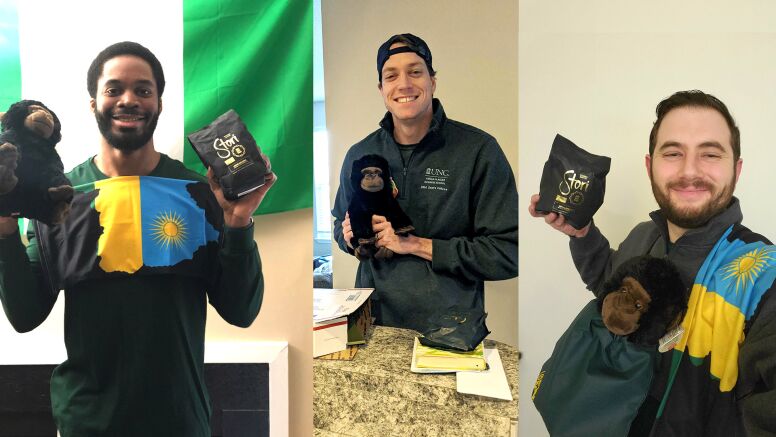
COVID-19 prevented students from studying abroad in early 2020, but it didn’t stop their learning and connecting across the globe.
The global program teams for the Undergraduate Business Program (UBP) and MBA Programs developed innovative avenues to continue students’ global education that didn’t involve travel.
“While many business schools didn’t offer their students global experiences in 2020-21 because of COVID-19, we deepened our commitment to our students’ global experiential learning,” says Valerie Slate, senior associate director of MBA global programs.
“The need to learn about the world and better understand others has never been greater,” says Angela Bond (BA ’95, MBA ’04), UBP director of global programs. “We have to determine how best to continue providing global educational experiences given the challenge of COVID. We know that participating in international educational experiences, virtual or in-country, prepares students to work across borders to create and implement solutions to global issues.”
So instead of cancelling the popular Global Immersion Electives (GIEs) in 2021, the global teams created virtual translations. Dubbed Virtual GIEs (V/GIEs), they included the typical cultural, community, projects and meetings with business people.
“The V/GIE is a unique way to experience culture, develop global competencies, engage with business leaders, and build community as a class,” says Slate.
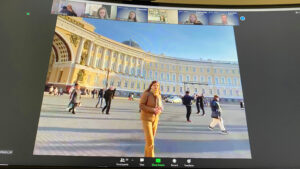
“Students couldn’t get those first-hand experiences that travel provides, but could still ‘visit’ and learn, see and listen,” says Bond.
On the V/GIEs, students engaged with local business leaders, entrepreneurs, government officials and experts. They participated in project-based work with local companies to solve real-world challenges. And worked with students in Kenya, South Africa and Hungary.
They engaged in interactive cultural experiences such as live cooking workshops, live guided tours, Zen meditation session with a monk in rural Japan, vodka tasting while learning about the history and industry’s importance to Russia and so much more.
“The global engagement continued,” says Slate. “All that stopped was travel.”
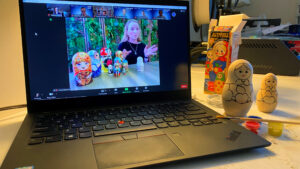 The students and the global program teams miss the travel component of GIEs, as do the professors who lead them. Arv Malhotra, H. Allen Andrew Professor of Entrepreneurial Education and professor of strategy and entrepreneurship, has led GIEs for more than 16 years. Seeing the world with his students is good for his soul, he says. “It teaches me as much as it teaches them.”
The students and the global program teams miss the travel component of GIEs, as do the professors who lead them. Arv Malhotra, H. Allen Andrew Professor of Entrepreneurial Education and professor of strategy and entrepreneurship, has led GIEs for more than 16 years. Seeing the world with his students is good for his soul, he says. “It teaches me as much as it teaches them.”
Instead in 2021, he taught a new VGIE on innovation and entrepreneurship in Russia and Estonia, and continued to teach the Global Business Strategy course for MBAs on strategy formulation and implementation in an international context.
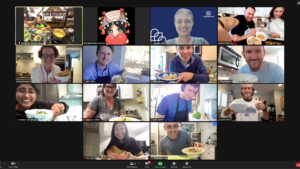 The range of VGIEs was wide and also included healthcare in Thailand and Japan led by Markus Saba; global entrepreneurship in Luxembourg and Denmark led by Ted Zoller; and business and culture in Costa Rica, Argentina and Chile led by Anna Hayes.
The range of VGIEs was wide and also included healthcare in Thailand and Japan led by Markus Saba; global entrepreneurship in Luxembourg and Denmark led by Ted Zoller; and business and culture in Costa Rica, Argentina and Chile led by Anna Hayes.
Learning beyond borders
Global education builds students’ self-awareness, communication skills, resiliency and flexibility. The virtual experiences also challenged students and moved them out of their comfort zones, influenced many to consider job-searches in the countries of the VGIE’s, and 100% enhanced their networks.
Here are a few highlights of the VGIEs.
South Africa
MBA students learned about sustainability and social enterprise in Southern Africa with Olga Hawn, and UBP students focused on Cape Town and Johannesburg, working with other UNC students and young South Africans to explore the challenges and opportunities they face in the developing economies of townships there.
Dave Bond, a UNC Kenan-Flagler lecturer and a native South African, led a leadership development South Africa V/GIE for Undergraduate Assured Admit Program students in collaboration with a team of South African faculty. They explored the importance of inclusive leadership, inclusive business and social entrepreneurship, as they broadened their experiences of other cultures, and honed global leadership skills and attributes.
“It provides a powerful lens for considering the current challenges facing society and businesses in America and elsewhere in the world,” says Bond. “We use unique and innovative approaches to learning: virtual experience, context-rich design thinking, and in-depth conversations with peers in a completely different part of the world.”

UBP students experienced Cape Town through virtual reality.
UBP students met and worked with other UNC students and young South Africans to explore the challenges and opportunities they face in the developing economies of South African townships. UNC professor Steven King and Marjolijn Dijksterhuis, who is based in South Africa, found local filmmakers and people willing to be part of the video creation to create a virtual-reality module that UBP students then experienced using Oculus VR headsets.
Hungary
UBP students were immersed in the business of Budapest in a V/GIE led by Michael Meredith, clinical associate professor of management and corporate communication. They explored social enterprise, business for good and cultural activism in Hungary, a country still transitioning economically, socially and politically from a post-war communist state to a democratic free market, says Meredith. Budapest is the hub city of Hungary’s business and economy, accounting for 39% of the national income, and among the top 100 GDP performing cities in the world.
“Our students engaged in virtual classes and teamwork with Corvinus University students,” says Meredith. “In these cross-cultural teams, they worked to solve an actual business problem for a Hungarian firm and presented strategic recommendations to the company.”
They shared cultural experiences, too, including a cooking/baking social.
Students widened their global perspective and gained project-based international business experience, says Meredith. “They developed a deep understanding of the interconnectedness of global markets, gained insight into aspects of technology and innovation in Central Europe, and experienced working in teams that are both virtual and cross-cultural.”
Rwanda
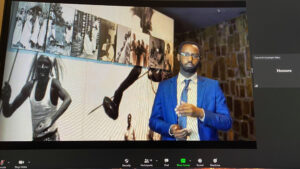 The Vetter Dean’s Fellows explored Rwanda. They heard from Josh Ruxin, author of “A Thousand Hills to Heaven: Love, Hope and a Restaurant in Rwanda,” and learned about the history of Rwanda and events leading up to the 1994 genocide. They shared project/service learning and collaborated with students at Agahozo Shalom Youth Village, home for orphans of the genocide and AIDs in Rwanda. They learned about the coffee business, ecotourism and politics that included a talk by a female member of Rwanda’s parliament.
The Vetter Dean’s Fellows explored Rwanda. They heard from Josh Ruxin, author of “A Thousand Hills to Heaven: Love, Hope and a Restaurant in Rwanda,” and learned about the history of Rwanda and events leading up to the 1994 genocide. They shared project/service learning and collaborated with students at Agahozo Shalom Youth Village, home for orphans of the genocide and AIDs in Rwanda. They learned about the coffee business, ecotourism and politics that included a talk by a female member of Rwanda’s parliament.
In the V/GIEs, students developed skills that are high demand by employers: working in diverse environments, collaborating on cross-cultural teams and virtual teams, adaptability, and working with a virtual team to solve problems similar to those encountered in the classes.
Other innovations include:
- The new course “Managing COVID-19’s Unintended Healthcare Challenges in Kenya and the U.S.” was led by Markus Saba with Ben Ngoye of Strathmore University Business School in Nairobi. Students from both schools worked collaborative assignments.
- Sharon Cannon, clinical professor of management and corporate communication, received a grant from the American Council on Education to support COIL activity in partnership with Sophia University in Japan.
- Cross enrollments in the MBA and UBP programs were added so students could take a virtual course offered by international partner schools alongside their regular course schedule.
- Virtual versions of Doing Business In (DBI), short electives with MBA exchange partners, were created.
- The UBP’s new International Business Club brought together students from around the world to network and learn about global business trends through speaker series, professional development workshops and social events.
- UBP students competed with other top business school teams in a virtual case competition on Amazon’s potential investment in Chile or Argentina.
- A new Global Topics Speaker Series highlighted global careers and cultural experiences of recent UBP grads and international students.
In addition to the innovations, there are other silver linings about going virtual: programs are more accessible to more people, with more economic equity and no carbon emissions.
As face-to-face travel resumes, UNC Kenan-Flagler’s global programs’ teams continue to identify and implement innovative ways to offer meaningful global, experiential learning to students, building on the creativity, flexibility and collaboration the pandemic prompted.